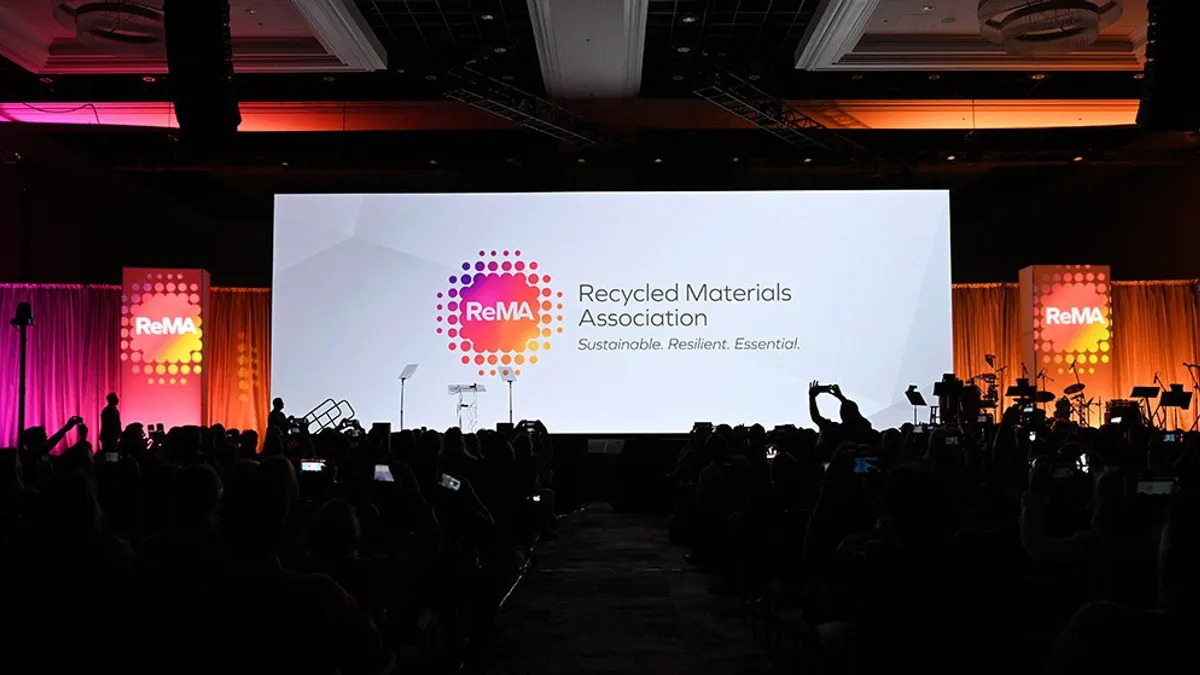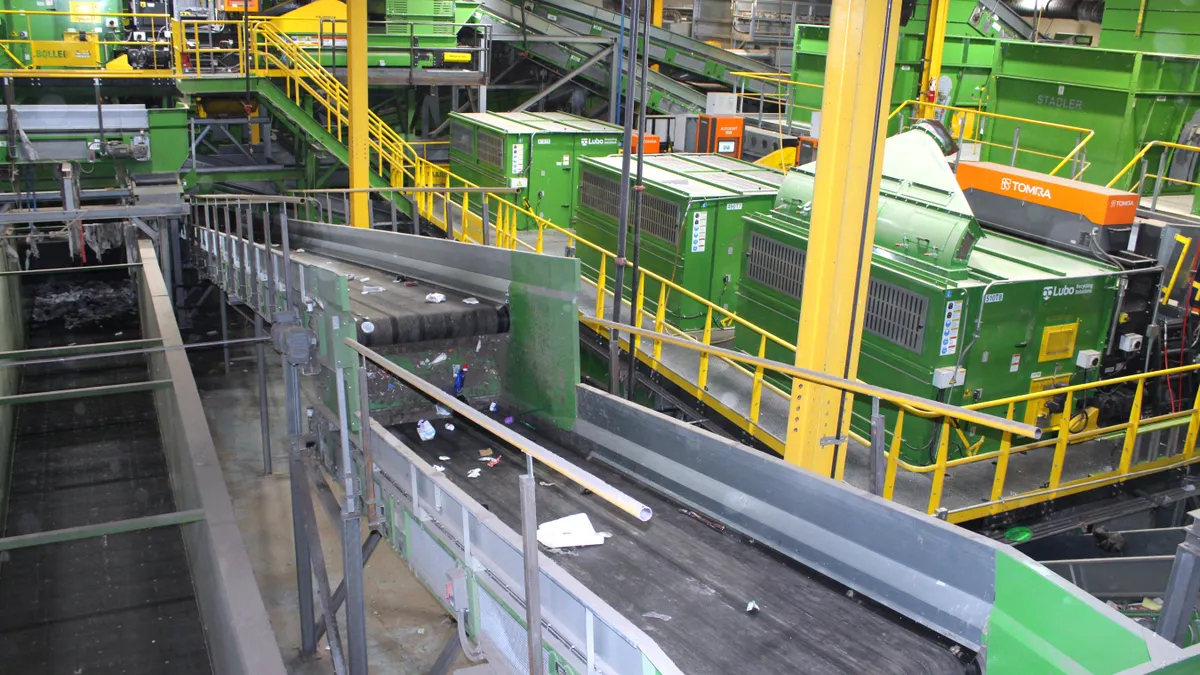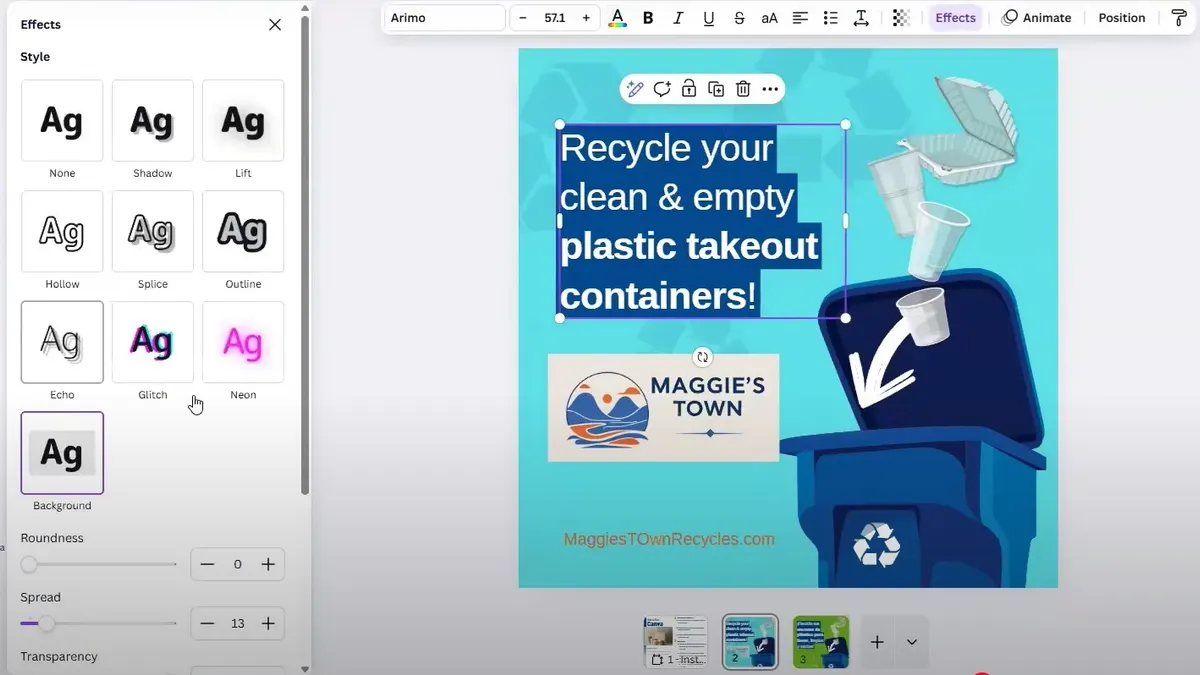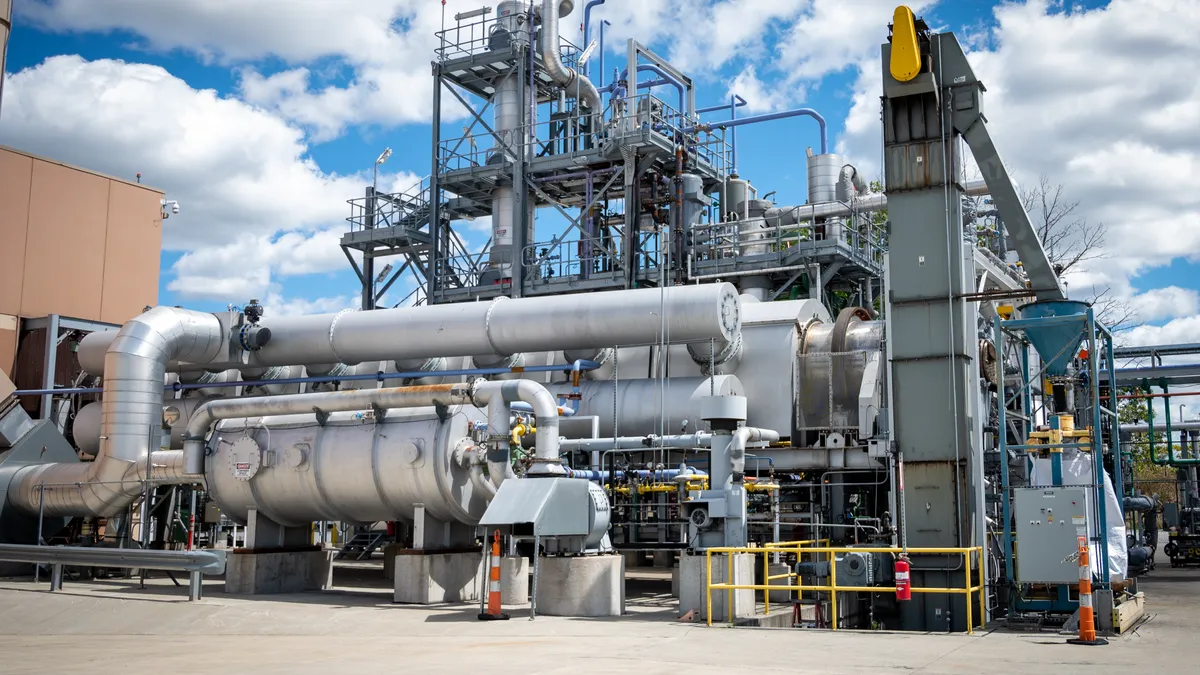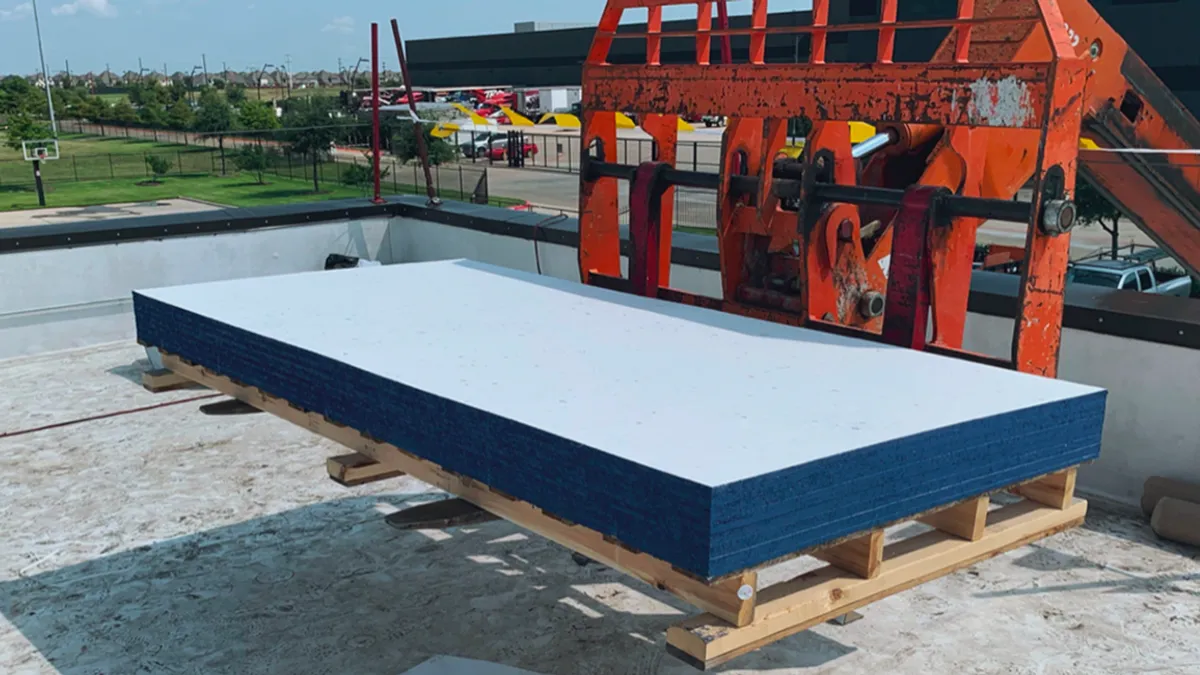The recycling industry has long positioned itself as part of an important environmental cause, but the freshly branded Recycled Materials Association now aims to show how its members are actively aligning with circular economy and sustainability initiatives in today’s world.
ReMA, previously known as the Institute of Scrap Recycling Industries, changed its name in April in an effort to better reflect the innovations and motivations of today’s recycling industry, said President Robin Wiener.
“Certainly, we haven't changed who we are, but we've changed how we express ourselves,” she said.
ReMA is made up of a range of recycling companies, as well as major brands that are getting involved in packaging design and recycling initiatives. Though the name is new, the association seeks to continue its recycling policy and advocacy work, both for longtime scrap recyclers and for newer members in emerging spaces such as EV battery recycling.
Wiener chatted with Waste Dive about how the association is updating its workforce development offerings and promoting cooperation among recycling stakeholders, while advocating for environmental policy initiatives and research into the industry’s impact on climate change.
This conversation has been edited for length and clarity.
WASTE DIVE: ISRI is now ReMA. How does the new name reflect what the organization is and does for recyclers, and what went into the decision-making to change it?

ROBIN WIENER: ISRI is a name that came up from the merger of two previous associations in 1987. There's no meaning to [the name] and it doesn't describe the industry. We went down the road of developing a language lexicon about three or four years ago, where we were trying to figure out how we better reach the audiences we need to reach. There's so many folks in the recycled space right now, so we need to make sure that our voice got out there.
We needed to rebrand in order to make it clear who we represent and what our members do, hence the Recycled Materials Association. Then there's the tagline, which is “Sustainable. Resilient. Essential.” That sends the message that we're sustainable by protecting the environment. We're resilient, strengthening the economy. And we're essential, making everyday life better.
How has the industry changed since those early days when ISRI first got its name in the ’80s, and how is ReMA adapting today?
I don't know that the core of the industry has really changed. What's evolved and what's changed is what the needs of the industry are from the association. The industry itself has evolved to be much more innovative. It’s always been innovative, but much more so now, with investment in high tech equipment — look at how AI and robotics are used in the industry.
Also, the commodities that make the recycled materials have broadened. It used to be when I first started in the industry a long time ago, there were plastics recyclers, metal recyclers, paper recyclers … now, they all do everything. There are still specialists, certainly, but there's much more of an integration across all of those types of recycled materials.
Another way it's evolved is that the companies are much more at the forefront of the movement towards decarbonization and sustainability as the global economy really is decarbonizing and electrifying. There's much more of a spotlight on the need for recycled materials to ensure an adequate supply of the critical minerals that are needed to fuel the movement towards decarbonization.
The industry becomes a key pillar to the global strategy to move us towards a decarbonized economy. And at the same time, the industry is also at the forefront of efforts of private companies to preserve resources to use more renewables.
We’re seeing the U.S. government, for example the U.S. Department of Energy and EPA, offering more funding for recycling and sustainability initiatives. From your perspective, what’s driving the U.S. national policy and interest in recycling and reuse initiatives, and how do recyclers fit into that?
I think that there's a combination of things, some having to do with us, some of it having nothing to do with us. At [the ISRI] convention in Las Vegas, we had a number of representatives from the Department of Energy talking about the number of programs they’re working on, because we're working very closely with the DOE, with Commerce, with EPA as these programs are evolving.
I think there's been a number of transitions that are occurring in the economy globally that are affecting our industry and that are putting our industry in the forefront. COVID highlighted how fragile supply chains are. Recycled materials are part of the manufacturing supply chain and always have been. But their important role in satisfying the needs of certain aspects of the manufacturing supply chain, especially for batteries for electric vehicles, became very important in the recognition that we've got those resources right at home.
We don't have to go to China or into these other countries and depend upon those other countries for their virgin counterparts. And we don't have to go extracting resources, we can use the renewable resources that are high quality and right at home.
Some of the strategic priorities mentioned in the association’s policy agenda update from last month include a focus on environmental stewardship and workforce development. How is ReMa tackling that?
In the last two years we completely restructured and reorganized our advocacy efforts to strengthen them and bring in new staff to supplement what we have. It’s a recognition that there's just so much more happening at the state level, [federal level] and internationally, and things are moving so quickly and we have to view these issues holistically.
[ReMA is building up its] sustainability program, which [encompasses] environmental issues and safety issues, but also workforce development.
When Cheryl [Coleman, ReMA’s senior vice president of advocacy, safety and sustainability] came on, she developed a program to widen the pipeline for apprenticeships and internships with HBCUs. We've expanded that to an inclusion program for those who are neurodiverse to help them enter the industry and provide job opportunities for them. That program is really exciting because we haven't had a workforce development arm until the last two years or so. We're really putting a lot of resources into that in order to make sure we can help our members in that area.
We're also working with [the Bureau of International Recycling] on a greenhouse gas emission study, which is going to help our members document their footprints.The problem is there is no definitive resource out there, anywhere in the U.S. or globally, about what exactly the greenhouse gas emissions savings are from using recycled materials versus using extracted resources. We can talk about how we save greenhouse gas emissions, but we don't have numbers, other than the WARM model.
There’s no good data out there. Especially as we get we're moving towards a decarbonized economy, what it means to be [decarbonizing] and how to quantify that becomes an issue. And I don't think we can be credible unless we understand those numbers. We reached out to BIR because we thought it made no sense for the U.S. industry to [do the study alone] because this is a global issue across borders. Hopefully it will be done by this time next year.
ReMA has a variety of members in the recycling arena, but it’s broadened its membership base in recent years. What does that look like now, and who is involved?
You know, it's interesting. At its core, it’s the same. But around the edges, there have certainly been changes, and that's because the nature of the materials going through the recycling stream are changing.
Where it's being seen most dramatically is really in the electronics area. Electronics recycling has been a core part of history for ISRI and ReMA, but now we're seeing more and more batteries. We're seeing electric vehicles. So that means that we're bringing in members who are involved in battery manufacturing, battery recycling and electric vehicle manufacturing.
Another [area of expansion], which happened a couple of years ago, is that we realized that we needed to develop a much more collaborative relationship with the brand manufacturers. We've always represented recycled materials, whether or not they're sourced in industrial, commercial or residential [streams], but the residential came so much more into focus over the last couple of years. That stream has changed dramatically over the last five years as a result of all the packaging, and design for recycling is a core issue we've worked on for years.
We need to work more on packaging and with the brands. So we created a new membership category, Brands Leadership Council, and we have a number of brands that are now part of it [such as inaugural members Unilever and Keurig Dr Pepper.]
Having them as members and having those open conversations is so important. And also, this may sound corny or trite, but I really do believe ISRI and ReMA is successful when members are collaborative. We don't always agree on issues, but we get to work together.
The brands are an area where that has to happen. It happens certainly through their membership in the Brands Leadership Council, where we developed a fiber recyclability protocol with them. It also happens in other ways. I sit on the board of The Recycling Partnership for that very reason. I sit on the board of Keep America Beautiful, because also a number of them are involved in KAB.
Another area that we've been very proactive on has been on helping create a national road map for electrification, and on batteries. On America Recycles Day, we held a summit where we brought together about 100 different stakeholders — policymakers, battery manufacturers, recyclers — to look at that road map and figure out how to work together. Because up until that time, everyone was in their own bubbles working on the issue, but weren't talking to each other. We’ll be following up on that by the end of the year and because the conversation is continuing, so I’m really excited about that.
This story first appeared in the Waste Dive: Recycling newsletter. Sign up for the weekly emails here.



